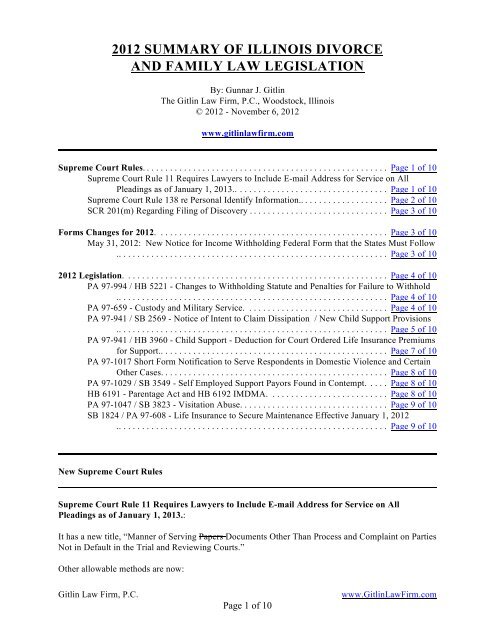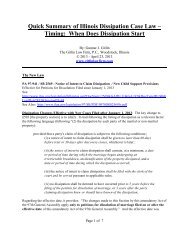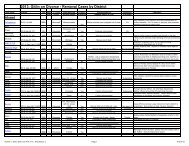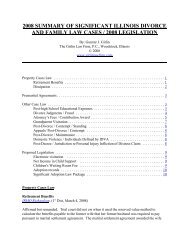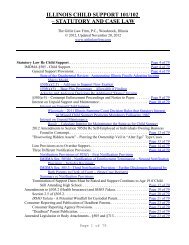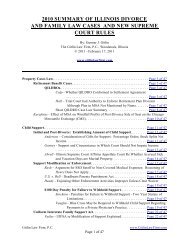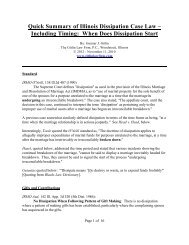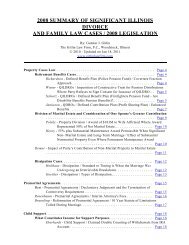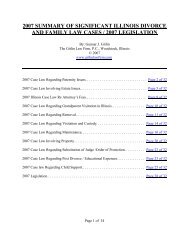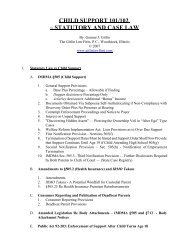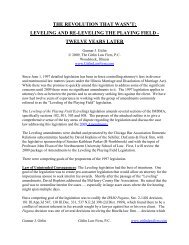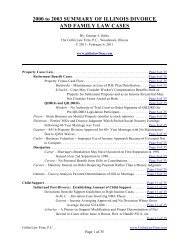Gitlin Law Firm 2010 Illinois Divorce and Paternity Case and ...
Gitlin Law Firm 2010 Illinois Divorce and Paternity Case and ...
Gitlin Law Firm 2010 Illinois Divorce and Paternity Case and ...
Create successful ePaper yourself
Turn your PDF publications into a flip-book with our unique Google optimized e-Paper software.
2012 SUMMARY OF ILLINOIS DIVORCEAND FAMILY LAW LEGISLATIONBy: Gunnar J. <strong>Gitlin</strong>The <strong>Gitlin</strong> <strong>Law</strong> <strong>Firm</strong>, P.C., Woodstock, <strong>Illinois</strong>© 2012 - November 6, 2012www.gitlinlawfirm.comSupreme Court Rules..................................................... Page 1 of 10Supreme Court Rule 11 Requires <strong>Law</strong>yers to Include E-mail Address for Service on AllPleadings as of January 1, 2013.................................. Page 1 of 10Supreme Court Rule 138 re Personal Identify Information.. . . . . . . . . . . . . . . . . . . Page 2 of 10SCR 201(m) Regarding Filing of Discovery . . . . . . . . . . . . . . . . . . . . . . . . . . . . . . Page 3 of 10Forms Changes for 2012. ................................................. Page 3 of 10May 31, 2012: New Notice for Income Withholding Federal Form that the States Must Follow........................................................... Page 3 of 102012 Legislation. ........................................................ Page 4 of 10PA 97-994 / HB 5221 - Changes to Withholding Statute <strong>and</strong> Penalties for Failure to Withhold........................................................... Page 4 of 10PA 97-659 - Custody <strong>and</strong> Military Service. . . . . . . . . . . . . . . . . . . . . . . . . . . . . . . Page 4 of 10PA 97-941 / SB 2569 - Notice of Intent to Claim Dissipation / New Child Support Provisions........................................................... Page 5 of 10PA 97-941 / HB 3960 - Child Support - Deduction for Court Ordered Life Insurance Premiumsfor Support.................................................. Page 7 of 10PA 97-1017 Short Form Notification to Serve Respondents in Domestic Violence <strong>and</strong> CertainOther <strong>Case</strong>s................................................. Page 8 of 10PA 97-1029 / SB 3549 - Self Employed Support Payors Found in Contempt. . . . . Page 8 of 10HB 6191 - Parentage Act <strong>and</strong> HB 6192 IMDMA. . . . . . . . . . . . . . . . . . . . . . . . . . Page 8 of 10PA 97-1047 / SB 3823 - Visitation Abuse. . . . . . . . . . . . . . . . . . . . . . . . . . . . . . . . Page 9 of 10SB 1824 / PA 97-608 - Life Insurance to Secure Maintenance Effective January 1, 2012........................................................... Page 9 of 10New Supreme Court RulesSupreme Court Rule 11 Requires <strong>Law</strong>yers to Include E-mail Address for Service on AllPleadings as of January 1, 2013.:It has a new title, “Manner of Serving Papers Documents Other Than Process <strong>and</strong> Complaint on PartiesNot in Default in the Trial <strong>and</strong> Reviewing Courts.”Other allowable methods are now:<strong>Gitlin</strong> <strong>Law</strong> <strong>Firm</strong>, P.C.Page 1 of 10www.<strong>Gitlin</strong><strong>Law</strong><strong>Firm</strong>.com
6) by transmitting them via e-mail to the designated e-mail address of record for the attorney or party;or(7) by transmission through a service provider that provides an electronic in-box for those partiesregistered to use the service.And there is a new Section 11(d): “(d) E-Mail Address. A party or an attorney must include on theappearance <strong>and</strong> on all pleadings filed in court an e-mail address for service of documents.”Supreme Court Rule 138 re Personal Identify Information.And we have a new Rule 138 The new rule 138 provides:Rule 138. Personal Identity Information(a) In civil cases, personal identity information shall not be included in documents or exhibits filedwith the court. This rule applies to paper <strong>and</strong> electronic filings.(b) Personal identity information, for purposes of this rule, is defined as follows:(1) Social Security numbers;(2) birth dates;(3) mother’s maiden names;(4) drivers license numbers;(5) financial account numbers, <strong>and</strong>(6) debit <strong>and</strong> credit card numbers.A court may order other types of information redacted or filed confidentially, consistent with thepurpose <strong>and</strong> procedures of this rule.(c) If the court orders the filing of documents or exhibits that contain personal identity information, theinformation shall be filed under seal in a document titled “Notice of Personal Identity InformationWithin Court Filing.” The notice shall identify the documents or exhibits that contain personal identityinformation <strong>and</strong> the order requiring the filing. The notice shall remain confidential, except to parties oras the court may order.(d) Neither the court, nor the clerk, is required to review documents or exhibits for compliance withthis rule.(e) If a document or exhibit is filed containing personal identity information, a party or any otherperson whose information has been filed may move that the court order redaction <strong>and</strong> filing asprovided in paragraph (f). The motion shall be filed under seal <strong>and</strong> the clerk shall remove thedocument or exhibit containing the personal identity information from public access pending thecourt’s ruling on the substance of the motion. A motion requesting redaction of a document in the courtfile shall have attached a copy of the redacted version of the document. If the court allows the motion,the clerk shall retain the unredacted copy under seal <strong>and</strong> the redacted copy shall become part of thecourt record.(f) If the court finds the inclusion of personal identity information was willful, the court may award theprevailing party reasonable expenses, including attorney fees <strong>and</strong> court costs.(g) This rule does not require any clerk or judicial officer to redact personal identity information fromthe court record except as provided in this rule. Adopted Oct. 24, 2012, effective Jan. 1, 2013.<strong>Gitlin</strong> <strong>Law</strong> <strong>Firm</strong>, P.C.Page 2 of 10www.<strong>Gitlin</strong><strong>Law</strong><strong>Firm</strong>.com
SCR 201(m) Regarding Filing of DiscoveryRegarding discovery generally provides:(m) Filing Materials with the Clerk of the Circuit Court. No discovery may be filedwith the clerk of the circuit court except upon leave by order of court or as authorizedor required by local rule or these rules. Local rules shall not require the filing ofdiscovery. Any party serving discovery shall file a certificate of service of discoverydocument.The committee comments state:October 24, 2012Paragraph (m) was amended in 2012 to eliminate the filing of discovery with the clerkof the circuit court absent leave of court granted in individual cases based on limitedcircumstances. The rule is intended to minimize any invasion of privacy that a litigantmay have by filing discovery in a public court file.While this does not mention filing of financial affidavits, the same rationale applies.Forms Changes for 2012:May 31, 2012: New Notice for Income Withholding Federal Form that the States Must Follow:See: www.acf.hhs.gov/programs/cse/newhire/employer/private/income_withholding.htm [EmployerInformation Page that should be read by any lawyer preparing these forms].www.acf.hhs.gov/programs/cse/forms/OMB-0970-0154.pdf [This is the Federal form that ours needsto follow - except for additional information, etc.]www.acf.hhs.gov/programs/cse/pol/AT/2011/at-11-05.htm [Action Transmittal of May 16, 2011 thatstates in part: “If the employer receives a document to withhold income that is not issued on theOMB-approved IWO form as required by federal law (§ 466(a)(8) <strong>and</strong> 466(b)(6)(A)(ii) of the Act)then the employer must reject the document <strong>and</strong> return it to the sender, effective 05/31/12.”www.ncjfcj.org/blog/2011/09/14/revisions-to-the-income-withholding-for-support-order/[Column by Cynthia Holden of Employer Services Team of the Federal Office of Child SupportEnforcement. It states in part:One change requires that the underlying child support order be attached to the IWOform if the order is issued by an entity other than a state/tribal child support agencyor a court. A checkbox has been added to page two for the employer/incomewithholder to indicate that the IWO is being returned because it does not directpayments to the State Disbursement Unit (SDU) or it is not regular on its face.Another change will take place at the end of May 2012 when employers will beginreturning income withholding orders that are not on the st<strong>and</strong>ard federal form.She then writes:<strong>Gitlin</strong> <strong>Law</strong> <strong>Firm</strong>, P.C.Page 3 of 10www.<strong>Gitlin</strong><strong>Law</strong><strong>Firm</strong>.com
Is it news to you that a st<strong>and</strong>ard form is used to withhold income for child support? Ifso, you may learn more about the form, instructions for its use, the legal basis for thisrequirement, <strong>and</strong> the different processes for new <strong>and</strong> existing IWOs in ActionTransmittal 11-05 [my link above]. You may also access the fillable IWO form on theOCSE website [my link also above]. Finally, a training presentation is provided toassist in completing the form; a sample IWO form with numbers makes it easier tofollow the instructions found in Action Transmittal 11-05 <strong>and</strong> in the trainingpresentation.One national employer already began returning orders that do not meet the criteriaoutlined in Action Transmittal 11-05, so please refer to the information provided in thelinks above for details regarding the new requirements. If you have questions, contactCindy Holdren at (240) 676-2808 or cynthia.holdren@acf.hhs.gov.http://www.acf.hhs.gov/programs/cse/newhire/employer/publication/iwoFlowchart.pdf[A flowchart not consistent with IL law regarding the ability to send a withholding notice where theunderlying order did not call for income withholding.Practice Note: The new language in the MSA could provide that the payor will pay directly to therecipient until such time as an income withholding notice is properly served <strong>and</strong> withholdingcommences.]2012 LegislationPA 97-994 / HB 5221 - Changes to Withholding Statute <strong>and</strong> Penalties for Failure to WithholdSee: http://www.ilga.gov/legislation/publicacts/fulltext.asp?Name=097-0994Public Act 97-994 has been effective since August 17, 2012. It dramatically changes the l<strong>and</strong>scapewhere the employer fails to withhold. It makes a number of changes to the Income-Withholding forSupport Act.(1) It effectively introduced a one year statute of limitations, requiring that an action to collect apenalty from a payor may not be brought more than one year after the date of the payor's allegedfailure to withhold or pay income.(2) The obligee (read support recipient) must now give written notice of the non-receipt of payment tothe payor by certified mail with return receipt requested. Within 14 days of receipt by the payor thepayor must (i) notify the obligee of the reason for the non-receipt of payment or (ii) make the requiredpayment, together with interest at the rate of 9 percent calculated from the date on which the paymentof income should have been made. If a payor fails to comply with this provision, the payor is subject tothe $100 per day penalty provided under the Act.(3) Most critically, it caps the total penalty for one occasion at $10,000 for a payor's failure to withholdor pay to the SDU an amount designated in the income-withholding notice.Effective August 17, 2012.See, e.g.: http://www.ilga.gov/legislation/ilcs/fulltext.asp?DocName=075000280K45See also Updated Article Regarding the $100 Per Day Penalties on <strong>Gitlin</strong> <strong>Law</strong> <strong>Firm</strong> website.<strong>Gitlin</strong> <strong>Law</strong> <strong>Firm</strong>, P.C.Page 4 of 10www.<strong>Gitlin</strong><strong>Law</strong><strong>Firm</strong>.com
PA 97-659 - Custody <strong>and</strong> Military ServiceSee: www.ilga.gov/legislation/publicacts/fulltext.asp?Name=097-0659&GA=97Sec. 603. Temporary Orders.(a) A party to a custody proceeding, including a proceeding to modify custody, may move for atemporary custody order. The court may award temporary custody under the st<strong>and</strong>ards of Section 602,<strong>and</strong> the st<strong>and</strong>ards <strong>and</strong> procedures of Section 602.1, <strong>and</strong> the provisions of subsection (f) of Section 610after a hearing, or, if there is no objection, solely on the basis of the affidavits or the agreement of theparties if the court finds that the parties' agreement is in the best interest of the child.Sec. 606. Hearings. ****(f) Custody <strong>and</strong> visitation proceedings in which a parent is a member of the United States ArmedForces who is deployed or has orders to be deployed shall, upon the request of either party or on thecourt's own motion receive expedited priority in being set for hearing.(g) In any custody or visitation proceeding in which a parent is a member of the United StatesArmed Forces who is deployed or who has orders to be deployed, the court shall, upon a request of theservice member, permit the deployed parent who is unavailable to appear for the proceeding to testifyby telephone, audiovisual means, or other electronic means. The court shall cooperate with thedeployed parent in designating an appropriate location for the testimony.Sec. 607. Visitation. ***(h) Upon motion, the court may allow a parent who is deployed or who has orders to be deployed as amember of the United States Armed Forces to designate a person known to the child to exercisereasonable substitute visitation on behalf of the deployed parent, if the court determines that substitutevisitation is in the best interest of the child. In determining whether substitute visitation is in the bestinterest of the child, the court shall consider all of the relevant factors listed in subsection (a) ofSection 602 <strong>and</strong> apply those factors to the person designated as a substitute for the deployed parent forvisitation purposes.Sec. 610. Modification. ***(e) (Blank). A party's absence, relocation, or failure to comply with the court's orders on custody,visitation, or parenting time may not, by itself, be sufficient to justify a modification of a prior order ifthe reason for the absence, relocation, or failure to comply is the party's deployment as a member ofthe United States Armed Forces.(f) A court may only provide for a temporary modification of a custody or visitation order during aperiod of a parent's deployment by the United States Armed Forces in order to make reasonableaccommodations necessitated by the deployment. The temporary order shall specify that deployment isthe basis for the order <strong>and</strong> shall include provisions for:(1) custody or reasonable visitation during a period of leave granted to the deployed parent if thecustody or reasonable visitation is in the child's best interest;(2) if appropriate, visitation by electronic communication; <strong>and</strong>(3) the court's reservation of jurisdiction to modify or terminate the temporary modification orderupon the termination of the deployed parent's deployment upon such terms <strong>and</strong> conditions as the courtmay deem necessary to serve the child's best interest at the time of the termination of the deployment.(g) A party's past, current, or possible future absence or relocation, or failure to comply with thecourt's orders on custody, visitation, or parenting time may not, by itself, be sufficient to justify amodification of a prior order if the reason for the absence, relocation or failure to comply is the party'sdeployment as a member of the United States Armed Forces.PA 97-941 / SB 2569 - Notice of Intent to Claim Dissipation / New Child Support Provisions<strong>Gitlin</strong> <strong>Law</strong> <strong>Firm</strong>, P.C.Page 5 of 10www.<strong>Gitlin</strong><strong>Law</strong><strong>Firm</strong>.com
8/10/2012 Senate Public Act . . . . . . . . . 97-0941See:http://www.ilga.gov/legislation/billstatus.asp?DocNum=2569&GAID=11&GA=97&DocTypeID=SB&LegID=62833&SessionID=84See Also: http://www.ilga.gov/legislation/97/SB/PDF/09700SB2569lv.pdfDissipation: The key change to §503 [the property section] is to (d)(2). It will read (starting January1, 2013) following the listing of dissipation as a relevant factor the following language:provided that a party's claim of dissipation is subject to the following conditions:;(i) a notice of intent to claim dissipation shall be given no later than 60 daysbefore trial or 30 days after discovery closes, whichever is later;(ii) the notice of intent to claim dissipation shall contain, at a minimum, a dateor period of time during which the marriage began undergoing an irretrievablebreakdown, an identification of the property dissipated, <strong>and</strong> a date or period oftime during which the dissipation occurred;(iii) the notice of intent to claim dissipation shall be filed with the clerk of thecourt <strong>and</strong> be served pursuant to applicable rules;(iv) no dissipation shall be deemed to have occurred prior to 5 years before thefiling of the petition for dissolution of marriage, or 3 years after the partyclaiming dissipation knew or should have known of the dissipation;Regarding the effective date, it provides: “The changes made to this Section by this amendatory Act ofthe 97th General Assembly apply only to petitions for dissolution of marriage filed on or after theeffective date of this amendatory Act of the 97th General Assembly.”Comment by GJG: I thought this was an excellent bill until I came to the end where it states, "(iv) nodissipation shall be deemed to have occurred prior to 5 years before the filing of the petition fordissolution of marriage, or 3 years after the party claiming dissipation knew or should have known ofthe dissipation."I can imagine cases where this simply would be unjust <strong>and</strong> an arbitrary restriction on the court's powerfollowing the seminal two decade old O'Neill decision. See, e.g., IRMO Gurda, 304 Ill.App.3d 1019(1st Dist. 1999) [reconciliation after the second divorce petition was a pretext for the husb<strong>and</strong>'smanipulation of marital funds <strong>and</strong> established 1990 as the date of irretrievable breakdown of themarriage; <strong>and</strong> IRMO Zweig, 343 Ill.App.3d 590 (5th Dist. 2003) [In determining the date as to fiveyears before separation, the appellate court found that the parties had lived in the same house but notlived “as husb<strong>and</strong> <strong>and</strong> wife.” This case involved a wife who appeared to have committed perjuryregarding her failed attempt to secure control of her husb<strong>and</strong>'s estate via proceedings to have himdeclared incompetent before the separation.]And weren't we waiting for the Family <strong>Law</strong> Study committee package before making substantivelegislative changes now that this package is in the legislative hopper?Child Support: Child Support provisions will also be changed. Some are small language issues.Right before the actual guidelines being stated, the legislation adds the word “educational” to thereason for support payments, i.e., to pay for “the reasonable <strong>and</strong> necessary educational, physical,mental <strong>and</strong> emotional health needs of the child.”The 505(a)(2) changes are more important <strong>and</strong> will read:<strong>Gitlin</strong> <strong>Law</strong> <strong>Firm</strong>, P.C.Page 6 of 10www.<strong>Gitlin</strong><strong>Law</strong><strong>Firm</strong>.com
(2) The above guidelines shall be applied in each case unless the court finds that adeviation from the guidelines is appropriate after considering the best interest of thechild in light of the evidence, including, but not limited to, makes a finding thatapplication of the guidelines would be inappropriate, after considering the bestinterests of the child in light of evidence including but not limited to one or more of thefollowing relevant factors: ***(d) the physical, mental, <strong>and</strong> emotional needs condition of the child, <strong>and</strong> hiseducational needs; <strong>and</strong>(d-5) the educational needs of the child; <strong>and</strong>Comment: So the key language is going from “makes a finding that application of the guidelineswould be inappropriate” to “finds that a deviation from the guidelines is appropriate.” This is a betterst<strong>and</strong>ard because the current st<strong>and</strong>ard essentially uses a double negative. The double negative is thatthe court follows the guidelines unless there is a finding that application in inappropriate.There is a new provision (2.5) that will read:(2.5) The court, in its discretion, in addition to setting child support pursuant to theguidelines <strong>and</strong> factors, may order either or both parents owing a duty of support to achild of the marriage to contribute to the following expenses, if determined by thecourt to be reasonable:(a) health needs not covered by insurance;(b) child care;(c) education; <strong>and</strong>(d) extracurricular activities.PA 97-941 / HB 3960 - Child Support - Deduction for Court Ordered Life Insurance Premiumsfor Support8/10/2012 Public Act . . . . . . . . . 97-0941See:www.ilga.gov/legislation/billstatus.asp?DocNum=3960&GAID=11&GA=97&DocTypeID=HB&LegID=62804&SessionID=84See also: http://www.ilga.gov/legislation/97/HB/PDF/09700HB3960lv.pdf (pdf)(f) Dependent <strong>and</strong> individual health/hospitalization insurance premiums <strong>and</strong> lifeinsurance premiums for life insurance ordered by the court to reasonably securepayment of ordered child support or support ordered pursuant to Section 513, any suchorder to entail provisions on which the parties agree or, otherwise, in accordance withthe limitations set forth in subsection 504(f)(1) <strong>and</strong> (2); [This later language had comemost recently from PA 097-0608 (the life insurance to secure maintenance provisioneffective January 1, 2012, discussed below)].So, simplified the language reads under (f): “Dependent <strong>and</strong> individual health/hospitalizationinsurance premiums <strong>and</strong> premiums for life insurance ordered by the court to reasonably securepayment of ordered child support.”<strong>Gitlin</strong> <strong>Law</strong> <strong>Firm</strong>, P.C.Page 7 of 10www.<strong>Gitlin</strong><strong>Law</strong><strong>Firm</strong>.com
PA 97-1017 Short Form Notification to Serve Respondents in Domestic Violence <strong>and</strong> CertainOther <strong>Case</strong>sDomestic violence form. Public Act 97-1017 (Cunningham, D-Chicago; Kotowski, D-Park Ridge)allows a statutory short-form notification to be used to serve on respondents in the <strong>Illinois</strong> DomesticViolence Act of 1986, the Stalking No-Contact Order Act, <strong>and</strong> the Civil No-Contact Order Act.Effective January 1, 2013.PA 97-1029 / SB 3549 - Self Employed Support Payors Found in ContemptStatus: 8/17/2012 Senate Public Act . . . . . . . . . 97-1029See:http://www.ilga.gov/legislation/billstatus.asp?DocNum=3549&GAID=11&GA=97&DocTypeID=SB&LegID=65315&SessionID=84See also:This public act adds new provisions to the lengthy (b) to §505:If a person who is found guilty of contempt for failure to comply with an order to paysupport is a person who conducts a business or who is self-employed, the court inaddition to other penalties provided by law may order that the person do one or more ofthe following: (i) provide to the court monthly financial statements showing income<strong>and</strong> expenses from the business or the self-employment; (ii) seek employment <strong>and</strong>report periodically to the court with a diary, listing, or other memor<strong>and</strong>um of his or heremployment search efforts; or (iii) report to the Department of Employment Securityfor job search services to find employment that will be subject to withholding of childsupport.It also amends:The Public Aid Code: 305 ILCS 5/10-10IPA of 1984Non-Support Punishment ActHB 6191 - Parentage Act <strong>and</strong> HB 6192 IMDMAThese two bills were filed on May 31, 2012 <strong>and</strong> relate to the Family <strong>Law</strong> Study Committee rewrites.These bills should come up for hearing this fall <strong>and</strong> may be moved in Veto Session. They currentlyhave been referred to Rules committee.The links to view these bills are below:HB6191 - Parentage Actwww.ilga.gov/legislation/billstatus.asp?DocNum=6191&GAID=11&GA=97&DocTypeID=HB&LegID=67551&SessionID=84See also: http://www.ilga.gov/legislation/97/HB/PDF/09700HB6191lv.pdfHB6192www.ilga.gov/legislation/billstatus.asp?DocNum=6192&GAID=11&GA=97&DocTypeID=HB&LegID=67552&SessionID=84Last Act: 6/27/2012 House Referred to Rules Committee<strong>Gitlin</strong> <strong>Law</strong> <strong>Firm</strong>, P.C.Page 8 of 10www.<strong>Gitlin</strong><strong>Law</strong><strong>Firm</strong>.com
See PDF: http://www.ilga.gov/legislation/97/HB/PDF/09700HB6192lv.pdfPA 97-1047 / SB 3823 - Visitation Abuse8/21/2012 Public Act . . . . . . . . . 97-1047Synopsis As Introduced: Amends the <strong>Illinois</strong> Vehicle Code <strong>and</strong> the IMDMA.Provides that the Secretary of State shall suspend, pursuant to court order, the driver's license of aperson adjudicated by a court to have engaged in visitation abuse. Provides procedures for thatsuspension process. Provides that the court, upon finding that a party engaged in visitation abuse, mayorder: the suspension of the offending party's <strong>Illinois</strong> driving privileges pursuant to the <strong>Illinois</strong> VehicleCode, until the court has determined that there has been sufficient compliance with the court'svisitation order <strong>and</strong> that full driving privileges shall be reinstated; the issuance of a familyresponsibility driving permit to the offending party to allow limited driving privileges for employment,for medical purposes, <strong>and</strong> to transport a child pursuant to a visitation order; the placement of theoffending party on probation; or the sentencing of the offending party to periodic imprisonment for upto 6 months, provided that the court may allow periods of release for work. Effective immediately.Senate Committee Amendment No. 1Further amends the <strong>Illinois</strong> Marriage <strong>and</strong> Dissolution of Marriage Act.Provides if the court, upon holding a party in contempt for violation of a visitation order <strong>and</strong> findingthat the party engaged in visitation abuse, may find that the party is guilty of a petty offense <strong>and</strong>impose a fine of no more than $500 for each finding of visitation abuse.SB 1824 / PA 97-608 - Life Insurance to Secure Maintenance Effective January 1, 2012PA-97-608: These amendments have been effective since January 1, 2012. We have a new section tothe property section (§503) that now reads:(b-5) As to any policy of life insurance insuring the life of either spouse, or any interestin such policy, that constitutes marital property, whether whole life, term life, groupterm life, universal life, or other form of life insurance policy, <strong>and</strong> whether or not thevalue is ascertainable, the court shall allocate ownership, death benefits or the right toassign death benefits, <strong>and</strong> the obligation for premium payments, if any, equitablybetween the parties at the time of the judgment for dissolution or declaration ofinvalidity of marriage.The maintenance section, now adds a new paragraph (f):(f) An award ordered by a court upon entry of a dissolution judgment or upon entry ofan award of maintenance following a reservation of maintenance in a dissolutionjudgment may be reasonably secured, in whole or in part, by life insurance on thepayor's life on terms as to which the parties agree, or, if they do not agree, on suchterms determined by the court, subject to the following:(1) With respect to existing life insurance, provided the court is apprised throughevidence, stipulation, or otherwise as to level of death benefits, premium, <strong>and</strong> otherrelevant data <strong>and</strong> makes findings relative thereto, the court may allocate death benefits,the right to assign death benefits, or the obligation for future premium paymentsbetween the parties as it deems just.(2) To the extent the court determines that its award should be secured, in whole or in<strong>Gitlin</strong> <strong>Law</strong> <strong>Firm</strong>, P.C.Page 9 of 10www.<strong>Gitlin</strong><strong>Law</strong><strong>Firm</strong>.com
part, by new life insurance on the payor's life, the court may only order: (i) that thepayor cooperate on all appropriate steps for the payee to obtain such new lifeinsurance; <strong>and</strong> (ii) that the payee, at his or her sole option <strong>and</strong> expense, may obtainsuch new life insurance on the payor's life up to a maximum level of death benefitcoverage, or descending death benefit coverage, as is set by the court, such level not toexceed a reasonable amount in light of the court's award, with the payee or the payee'sdesignee being the beneficiary of such life insurance.In determining the maximum level of death benefit coverage, the court shall take intoaccount all relevant facts <strong>and</strong> circumstances, including the impact on access to lifeinsurance by the maintenance payor. If in resolving any issues under paragraph (2) ofthis subsection (f) a court reviews any submitted or proposed application for newinsurance on the life of a maintenance payor, the review shall be in camera.(3) A judgment shall expressly set forth that all death benefits paid under life insuranceon a payor's life maintained or obtained pursuant to this subsection to securemaintenance are designated as excludable from the gross income of the maintenancepayee under Section 71(b)(1)(B) of the Internal Revenue Code, unless an agreement orstipulation of the parties otherwise provides.Child support has amended section (f) -- adds to the deduction for child support:Dependent <strong>and</strong> individual health/hospitalization insurance premiums <strong>and</strong> life insurancepremiums for life insurance ordered by the court to reasonably secure child support orsupport ordered pursuant to Section 513, any such order to entail provisions on whichthe parties agree or, otherwise, in accordance with the limitations set forth insubsection 504(f)(1) <strong>and</strong> (2);But as indicated above, this amended Section (f) may be amended once more in 2012.Section 510(c) adds a new portion that now reads:*** Any obligation of a payor party for premium payments respecting insurance onsuch party's life imposed under subsection (f) of Section 504 is also terminated on theoccurrence of any of the foregoing events, unless otherwise agreed by the parties. Anytermination of an obligation for maintenance as a result of the death of the payor party,however, shall be inapplicable to any right of the other party or such other party'sdesignee to receive a death benefit under such insurance on the payor party's life.Gunnar J. <strong>Gitlin</strong>The <strong>Gitlin</strong> <strong>Law</strong> <strong>Firm</strong>, P.C.663 East Calhoun StreetWoodstock, IL 60098815-338-9401, © 2012G:\Docs\Writings\2012 <strong>Illinois</strong> Legislation.wpdLast Updated on: November 6, 2012<strong>Gitlin</strong> <strong>Law</strong> <strong>Firm</strong>, P.C.Page 10 of 10www.<strong>Gitlin</strong><strong>Law</strong><strong>Firm</strong>.com


